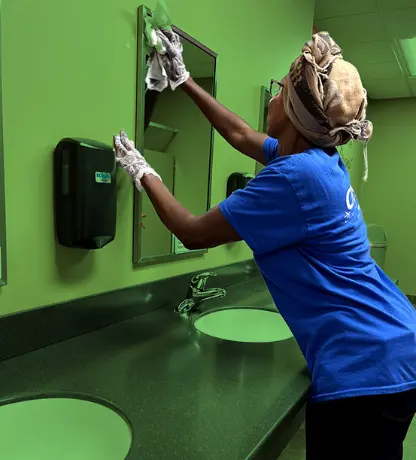
10 Office Hot Spots for Illness Spreading Germs
Prevent the Spread of Coronavirus and Flu Germs by Regularly Cleaning These Touch...
From office spaces and healthcare centers to parking lots and industrial facilities, Cleantec offers reliable, top-quality cleaning services designed to meet your specific needs. Let us handle the mess so you can focus on what matters.


Since 1975, Cleantec has been delivering professional cleaning services for businesses across a range of industries in the US. From parking lots to industrial facilities, we ensure every part of your property is spotless. With proactive inspections and 24/7 workforce management, you can count on us to keep your space in top condition—no matter the location.
At Cleantec, our focus is on creating strong, lasting relationships with every client. We take pride in delivering consistent, high-quality cleaning services that meet your needs and exceed your expectations.
Looking for consistent cleaning services or a one-time deep clean? Whether it’s regular upkeep or monthly deep cleaning, Cleantec offers flexible service packages tailored to meet the needs of your commercial property.
We adhere to the highest standards within the cleaning industry for optimal performance, consistency and safety across all locations. As proof of our compliance with rigorous professional guidelines, we hold the highly esteemed ISSA CIMS GB with Honors certification from the Worldwide Cleaning Industry Association.
We keep your workspace spotless! Whether it's daily cleaning or a more tailored solution, our eco-friendly products and top-tier equipment ensure your space is always fresh, safe, and inviting for your team and guests.
We take care of the details so you can focus on your business. Our facility maintenance services ensure everything runs smoothly, from regular checkups to preventing any issues before they arise. Let us keep your operations stress-free!
Enjoy crystal-clear windows with our streak-free window washing. Our eco-friendly cleaning leaves your windows spotless, letting in the sunshine and enhancing your space’s overall look.
When it’s time to get deep into those hard-to-reach places, we’ve got the tools and know-how. Our deep cleaning service reaches every nook and cranny, giving your space a thorough refresh that makes it feel like new.
Got a unique cleaning challenge? We've got it covered. Whether it's a one-time deep clean or an ongoing special project, we're here to make sure everything sparkles and exceeds your expectations.
Need cleaning supplies? We’ve got you covered. From sanitizers to everyday office essentials, our direct sales service ensures you have everything you need to maintain a clean, healthy workspace.
Cleantec has been providing top-tier cleaning services for a wide variety of commercial properties across the U.S. Our well-trained, insured, and experienced staff consistently delivers superior results, building an outstanding reputation in the industry.
In a competitive industry, Cleantec stands out with personalized cleaning solutions that cater to each client’s unique needs. We pride ourselves on being responsive, reliable, and dedicated to keeping your space looking its best—so you can focus on what matters most to you.

We make the cleaning process easy and stress-free. From our initial conversation to your final service, we handle everything—so you don’t have to.
Our Process in Three Easy Steps
Start by reaching out to us online or by phone for a free consultation. We’ll learn about your space and specific cleaning needs.
We'll recommend services that fit your space and schedule, handling all the details—from staffing to quality checks.
With everything in place, schedule your service. Our team will arrive on time, ensuring your space is left spotless and ready to impress.
See the Cleantec team in action! Here’s a look at some of the recent projects we’ve completed, showing the care and expertise we bring to every cleaning task—whether it’s maintaining office spaces, industrial sites, or retail environments.
Since the beginning, we’ve proudly served a wide range of clients, building long-lasting partnerships through our dedication to quality. Here’s what some of them have to say about our top-tier cleaning services.
Have questions about our services? Here are the answers to some of the most common inquiries from our customers:
We provide comprehensive janitorial cleaning services tailored to meet the specific needs of commercial and industrial clients, ensuring a clean and safe environment. Additionally, we offer facility maintenance services to maintain the operational efficiency of your premises. Our expertise also extends to construction cleanup and handling special projects, allowing businesses to focus on their core activities while we manage the cleanliness and maintenance aspects.
Our team stays ahead of industry trends by actively participating in professional organizations. We are proud members of the following associations, which help us maintain the highest standards of service and sustainability.






Browse our latest blog posts to discover helpful insights and tips on a range of cleaning topics, industry trends, and best practices.

Prevent the Spread of Coronavirus and Flu Germs by Regularly Cleaning These Touch...

Ensuring your facilities are regularly cleaned is a priority, but who should perform...

As a professional commercial cleaning business, we have received an influx of questions...